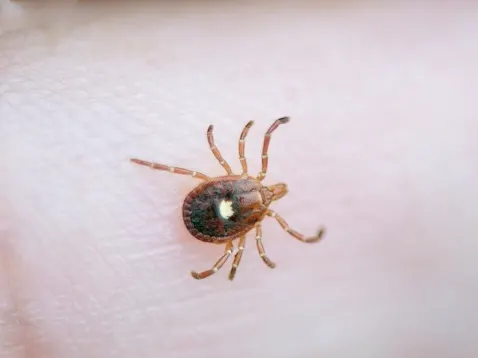
The tick that can make you allergic to meat is now in Ontario
Ants may not be the most unwelcome visitor at your Canada Day picnic.
Named after the single light spot on the back of adult females of the species, the Lone Star is most commonly found in the U.S. Southeast but its range stretches from Maine to Mexico, and now it's showing up on this side of the border.
Summer revealed! Visit our Complete Guide to Summer 2019 for an in-depth look at the Summer Forecast, tips to plan for it and much more
A veterinary clinic in London, Ontario, recently discovered a Lone Star tick one of its feline patients -- the bug infamous for causing life-long meat allergies in humans.
SEE ALSO: Woman air-lifted to hospital after tick bite
Responses to the Oakridge Animal Clinic's post about finding the tick in London suggested the species has also been spotted in other parts of the province, including Woodstock and Lindsay. In previous years, the tick has been reported in New Brunswick, and suspected in northern Quebec.
"It's a very scary tick," Dr. Gillian Egli, veterinarian and owner of Oakridge Animal Clinic, told CTV News London. "It carries diseases that can be transmitted to dogs, but also to humans."
According to the CDC, the ticks transmit a variety of diseases, including the Heartland Virus Disease and Southern tick-associated infectious disease, or STARI, a recently-identified illness similar to Lyme Disease. It's the adult females and ticks in the nymph stage that most frequently bite humans.
A recent study found the lone star's saliva contains a carbohydrate -- alpha-gal -- which sparks the development of antibodies in the human bite victim. These antibodies are triggered when the victim consumes meat that contains alpha-gal; specifically beef, lamb, and pork, and products derived from those animals, including milk and gelatin. The allergic reaction manifests one to three months after the bite.
And the reaction is an intense one -- anaphylaxis. Symptoms, which can occur as much as 10 hours after eating, can range from hives and vomiting to trouble breathing and dangerously low blood pressure.
RELATED: Little-known facts pet owners should know this tick season
The Oakridge Animal Clinic said the cat in question hadn't travelled outside of the area, meaning the tick must have hitched a ride on its feline host locally.
Ticks species aren't the only arachnids moving north. In recent years, black widow spiders have also started making their way into Ontario and Quebec.
Sources: CTV News | CDC | ACAAI | Frontiers in Immunology |